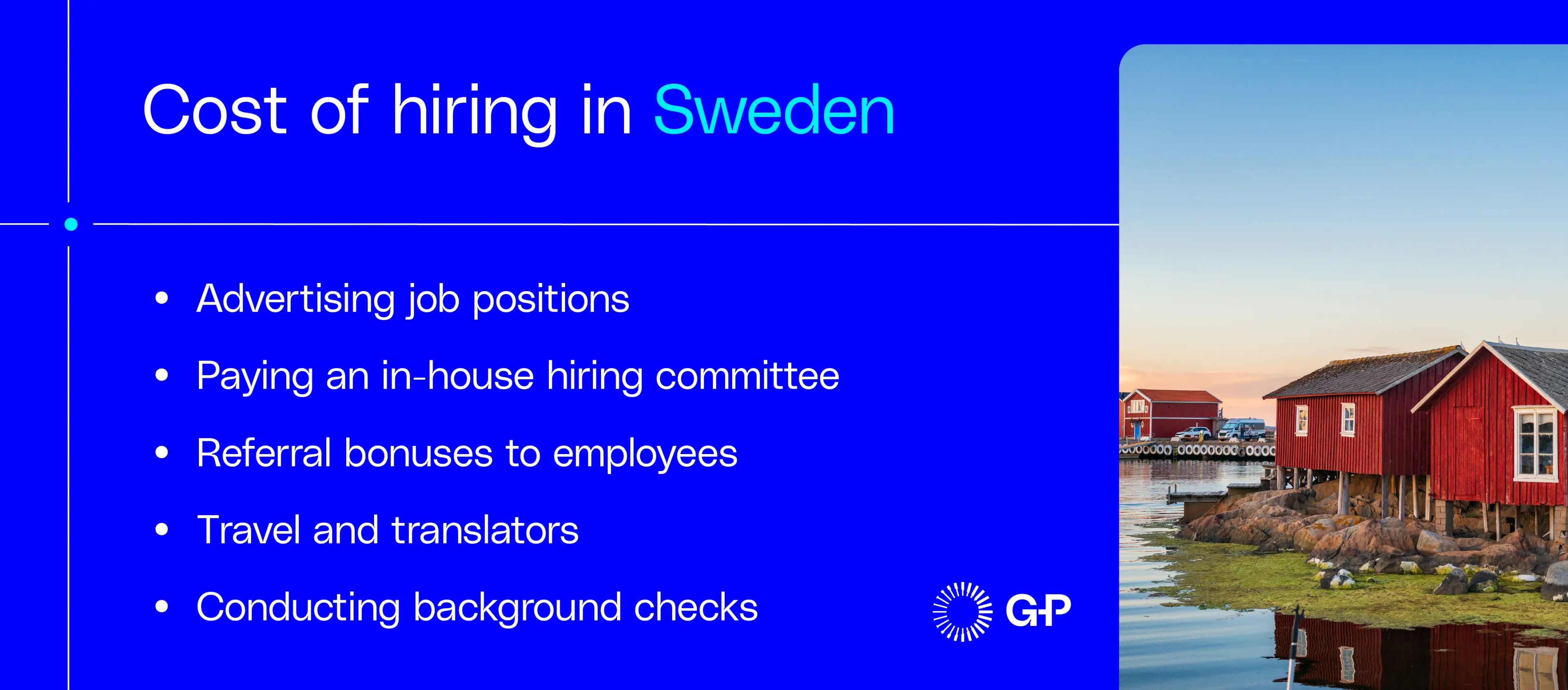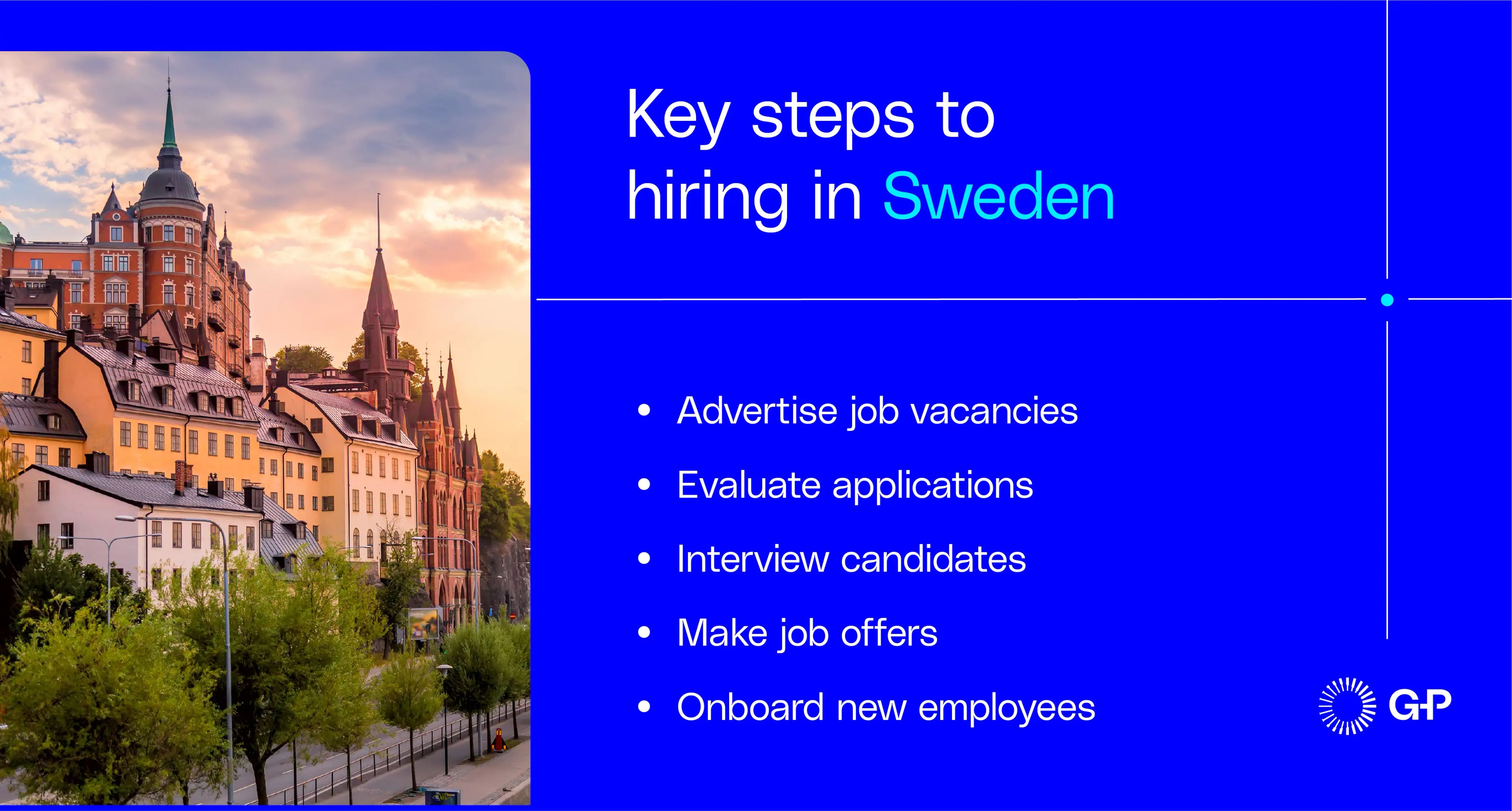Sweden has a well-educated, multilingual workforce with strong skills in IT, pharmaceuticals, green energy, and financial services. The country consistently ranks high in global innovation indexes and is known for its productive work culture.
Before expanding into Sweden, you’ll need a solid understanding of contracts, taxes, wages, benefits, and other employment considerations. Our guide will tell you everything you need to know about hiring in Sweden.

What to know before hiring in Sweden
If you’re expanding your business into Sweden for the first time, there are important legal requirements to be aware of. These norms and laws influence hiring practices in Sweden and many aspects of the employer-employee relationship, including compensation and benefits.
G-P Gia™, our AI-powered global HR agent, can answer your toughest compliance questions across 50 countries — including Sweden — and all 50 U.S. states. Reduce your reliance on outside counsel and cut the time and cost of compliance by up to 95% with Gia.
Here are five things to know about hiring in Sweden.
1. Trade unions
Sweden has one of the highest union rates in the world: 70% of workers are affiliated with a trade union. Unions negotiate Collective Bargaining Agreements (CBAs) with employers at national, sectoral, or company level. These agreements set wages, working conditions, benefits, and other employment terms for nearly 90% of the workforce because trade unions even cover non-members at workplaces where a CBA is in force.
2. Taxes
Sweden has a comprehensive and progressive tax system that includes national, municipal, and social security taxes. Higher-earning employees pay an income tax rate of over 50%. All residents pay municipal tax (between 29–35%, depending on the municipality) on their taxable income. For incomes above SEK 613,900 (2025), a national state tax of 20% is added to the portion above that threshold. There’s no local or regional income tax beyond the municipal tax.
Employers pay social security contributions (arbetsgivaravgifter). This is about 31.42% of gross salary and covers pensions, health insurance, parental leave, and other benefits. Employees don’t pay separate social security contributions; these are included in the employer’s payroll costs.
Employers are responsible for withholding income tax and remitting it to the Swedish Tax Agency (Skatteverket) every month. Employees file annual tax returns. However, most employees receive pre-filled returns from the Swedish Tax Agency and only need to confirm or adjust them if necessary.
3. Employment types and contracts
The Employment Protection Act (LAS) and CBAs govern employment contracts in Sweden. Employers provide a written statement of employment terms to the employee within one month of starting work. This document should include details such:
-
Job title
-
Duties
-
Salary
-
Working hours
-
Notice periods
-
Start date
-
Reference applicable collective agreement
Permanent (indefinite) contracts are the default and most common contract in Sweden. Indefinite contracts don’t have a fixed end date and continue until terminated by either party with proper notice and just cause. Fixed-term contracts are allowed for temporary projects or seasonal work. If an employee has multiple fixed-term contracts with the same employer for more than two years within a five-year period, the employment can automatically convert to permanency.
Sectoral or company-level CBAs set most employment terms like pay, working hours, and benefits. These agreements are legally binding for all employees at workplaces covered by the agreement, regardless of union membership. Notice periods and grounds for termination are regulated by law and CBAs. Dismissals have to be objectively justified, and employees have strong protections against unfair termination.
G-P EOR has an Employment Contact Generator to help you draft compliant employment contracts that meet all legal needs and best practices in Sweden.
4. Working hours
Sweden’s working hours highlight the country’s commitment to work-life balance. On average, an employee in Sweden works 1,441 hours per year. This is about 18% less than the OECD average.
Working hours are set by the Working Hours Act (Arbetstidslagen) and are further specified by CBAs. The average workweek is 40 hours spread over five days. Daily working hours and scheduling can vary by sector and agreement.
The statutory maximum working hours per week is 48. This includes overtime. Overtime is paid at premium rates set by the relevant CBA. Employees get at least 11 consecutive hours of rest each day and 36 hours of rest at the end of the week. Employees shouldn’t work longer than six hours without a break.
Flexible working arrangements and part-time work are common and protected by law. Employees have the right to ask for changes to their working hours, and employers must consider such requests.
5. Time off
Statutory law and CBA agreements govern time off. All employees, whether full-time or part-time, get at least 25 days of paid vacation every year. Many collective agreements include provisions for extra days. The Swedish Vacation Act gives employees the legal right to take four consecutive weeks of vacation during the summer.
Employees with a fixed monthly salary get a statutory holiday supplement of 0.43% of their monthly salary for each vacation day they take. The holiday supplement is paid in the month following the vacation. Sweden has 13–15 public holidays every year. These include New Year’s Day, Easter, Midsummer, and Christmas. Employees don’t usually have to work on these days. If they do, premium pay can apply.
In Sweden, the first day of sick leave is unpaid. Employers pay for the next 13 days at 80% of the employee’s salary. After this, the Swedish Social Insurance Agency (Försäkringskassan) provides sickness benefits. Vård av Barn (VAB) allows employees to take time off work to care for a sick child, but employers don’t pay for this time off. Instead, employees claim compensation from the Försäkringskassan.
Maternity and paternity leave are covered under parental leave. Parents share 480 days of paid leave for each child. 390 days are paid at approximately 80% salary (up to a specified cap). The rest are paid at a lower flat rate. 90 days are reserved for each parent and can't be transferred to the other. Parental leave is flexible and can be taken until the child turns 12.
Top hiring hubs in Sweden
Some cities in Sweden are known for particular industries. Knowing what each city has to offer allows you to focus your hiring efforts in the right place and fill roles faster.
The top talent hubs in Sweden are:
-
Stockholm is the capital and largest city. It’s Sweden’s main business and hiring hub, especially for technology, finance, and professional services. Big companies like Spotify, Klarna, and Ericsson are headquartered here.
-
Gothenburg is home to Sweden’s automotive industry. Companies like Volvo Cars, AB Volvo, CEVT, and Polestar have a presence here.
-
Malmö is located in southern Sweden. It’s a hub for logistics, technology, and international business. The city has close commercial ties to Copenhagen, Denmark via the Öresund Bridge.
-
Uppsala is known for its university and research institutions. It’s a center for life sciences, pharmaceuticals, and education.
-
Lund is famous for Lund University, one of Scandinavia's oldest universities. Lund is known for its technology, research, and innovation sectors, particularly in life sciences and IT.
Key industries in Sweden
Understanding Sweden’s main industries helps you benchmark salaries and benefits. You can use this insight to make smart choices about where to invest and grow your workforce.
The main industries in Sweden include:
-
Technology and IT: Sweden is a leader in technology, particularly in Stockholm. The country is known for innovation in software, telecommunications, and digital services. It’s home to successful companies like Spotify and Klarna. Specialist talent includes software development, cybersecurity, AI, data science, and gaming.
-
Manufacturing and engineering: Sweden has a long tradition of advanced engineering and high-quality manufacturing. This sector includes automotive companies such as Volvo and Scania, as well as machinery and industrial equipment. Specialist talent includes engineers, R&D specialists, and roles in manufacturing and supply chain.
-
Life sciences and pharmaceuticals: Sweden is a hub for biotechnology, pharmaceuticals, and medical technology. Specialist talent includes researchers, medical professionals, biotechnologists, and pharmaceutical specialists.
-
Green energy and environmental technology: The country invests heavily in renewable energy. Waterpower is a big source of electricity for Sweden. Specialist talent includes various engineering roles.
-
Financial services: Sweden has a strong banking, insurance, and fintech sector. Specialist talent includes various software engineers and developers, finance analysts, and accountants and auditors.

Cost of hiring an employee in Sweden
Whether you’re hiring one employee or an entire team in Sweden, expenses are inevitable. Budget for the following:
-
Setting up an entity (unless you partner with an employer of record)
-
Advertising job positions
-
Paying referral bonuses to employees with connections in Sweden
-
Paying an in-house hiring committee
-
Traveling to and from Sweden, including hotel stays, meals, and transportation
-
Partnering with a translator to draft documents or facilitate conversations (if applicable)
-
Using a background check service for screening candidates
According to G-P Verified sources from Gia, the employer burden rate in Sweden, which includes costs triggered on top of salaries, is around 31.42%.
What does a company need to do to hire employees in Sweden?
Make sure you cover these essentials before expanding your team in Sweden:
-
Paying tax to register your company with the Swedish Tax Agency (Skatteverket)
-
Registering a local branch with the Swedish Companies Registration Office
-
Opening a bank account once you’re officially incorporated
-
Depositing the minimum required capital
-
Consulting with a Swedish law firm to stay compliant through the hiring process
Setting up a subsidiary in Sweden can take weeks or months. Use G-P EOR to hire full-time employees in Sweden without setting up your own entity. Build your team in Sweden at a lower cost and with peace of mind that you’re doing so compliantly.

Steps to hiring in Sweden
The hiring process in Sweden is similar to the one you’re likely familiar with in your own country. The hiring process follows five basic steps: advertising the job, evaluating applications, interviewing candidates, sending job offers, and onboarding new employees.
1. Advertise job vacancies
Companies have to advertise all job vacancies on Platsbanken, the Swedish public employment service’s official job board. This rule promotes transparency and equal opportunity for all job seekers.
Use inclusive and nondiscriminatory language in your job posting. Any language requirements, such as Swedish proficiency, has to be justified and documented.
2. Evaluate applications
Evaluate candidates based on their relevant qualifications and competencies. Sweden’s antidiscrimination framework is one of the strongest in Europe. The Discrimination Act prohibits discrimination based on gender identity, ethnicity, religion, disability, sexual orientation, and age.
3. Interview candidates
Interview candidates who made it onto your shortlist. You can do these interviews in person or virtually. Remember to use structured, nondiscriminatory interview questions. Keep documentation of the recruitment process, including job advertisements, interview notes, and hiring decisions.
Gia can help you create questions that follow antidiscrimination laws in Sweden, so you can find the best fit for the role while complying with local regulations.
4. Make job offers
Contact your chosen candidate to offer them a position with your company. Most employees are covered by CBAs. These agreements set wages, working hours, overtime, parental leave, pensions, and other conditions. Although verbal agreements are legally valid in Sweden, we recommend providing a written contract outlining all terms of employment.
5. Onboard new employees
Now you can onboard new employees. You’ll have to register with the Swedish Tax Agency before paying wages or benefits. New employees need a personal identity number (personnummer) for tax and social security purposes. Onboarding best practices include pre-employment communication, orientation, role-specific training, and compliance with work environment regulations.
If you’re working with an EOR like G-P, you won’t have to worry about the administrative burden of onboarding. We’ll streamline the process, so you can focus on training your new hire and integrating them into your company culture.
Hiring contractors in Sweden
Working with independent contractors in Sweden can be a cost-effective way to test the market and build a presence, without the commitment of full-time employees. Contractors based in Sweden understand local consumer behavior, rules, and business practices. They’ll be ready to start working quickly with their own equipment and established work processes.
Hiring contractors allows you to easily adjust your workforce based on your business needs, without the complexities and costs of employment.
Before you enter an agreement with an independent contractor in Sweden, consider the following:
1. Employees vs. independent contractors
It’s important to understand the difference between employees and independent contractors. In Sweden, employers hire employees to do work and, in return, pay them a regular salary and benefits. Independent contractors provide services. Unlike employees, contractors set their schedules, use their own equipment, and work on specific projects rather than having an ongoing role.
2. Penalties for misclassification
The Swedish Tax Agency (Skatteverket) and the Swedish Work Environment Authority (Arbetsmiljöverket) oversee worker classification. Classifying someone as a contractor when they’re not can lead to severe penalties. If misclassification occurs, you’ll have to:
-
Pay retroactive taxes and social security contributions.
-
Provide retroactive employment benefits to the employee, such as paid leave and pension contributions.
-
Pay administrative sanction fees.
3. How to pay contractors in Sweden
G-P Contractor™ takes away the messy, time-consuming process of hiring and paying international contractors. You can create and issue contracts and pay contractors with just a few clicks, all while ensuring a compliant process.
Hire employees and contractors in Sweden with G-P
Our SaaS and AI-powered products – EOR, Contractor, and Gia – help companies as they build and manage global teams.
G-P is the recognized leader in global employment with more than a decade of experience; the largest team of HR, legal, and compliance experts; and a global proprietary knowledge base.
Make your expansion to Sweden easier with G-P. Contact us or book a demo today.





















